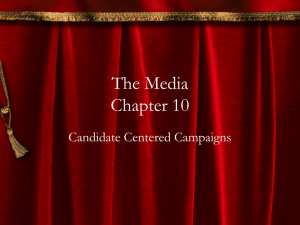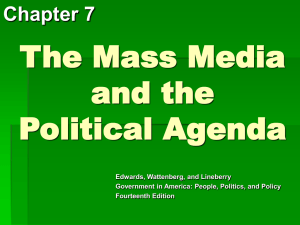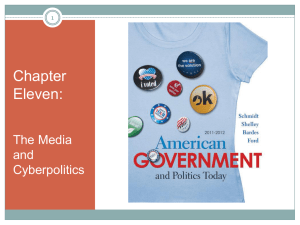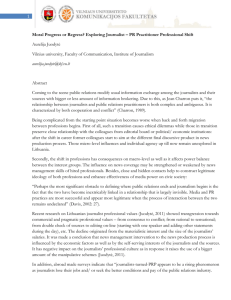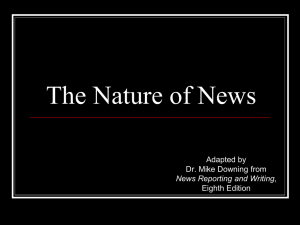APAGOPO Lecture 8 The Media
advertisement
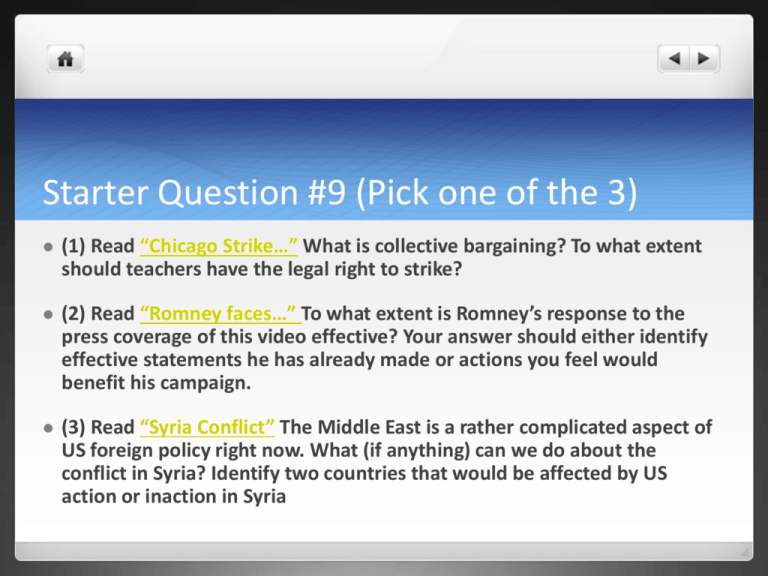
Starter Question #9 (Pick one of the 3) (1) Read “Chicago Strike…” What is collective bargaining? To what extent should teachers have the legal right to strike? (2) Read “Romney faces…” To what extent is Romney’s response to the press coverage of this video effective? Your answer should either identify effective statements he has already made or actions you feel would benefit his campaign. (3) Read “Syria Conflict” The Middle East is a rather complicated aspect of US foreign policy right now. What (if anything) can we do about the conflict in Syria? Identify two countries that would be affected by US action or inaction in Syria The Media By Mr. Miguel Academy of Our Lady of Guam Essential Questions How strong of an effect does media have on us? Are media a mirror of reality? What is news? What stories should take up space/time? What sources are credible? What should be emphasized? Primary functions of media Inform the public Entertain the public Watchdog Who gets what news from where Who gets what news from where Newspapers and Magazines Radio Television The Internet Who Gets what news from where Traditionalists Integrators Stick to network news as primary source ¼ of public, news from TV but also go online for news daily Older, less well-educated Well to do, middle aged Net-Newsers More online news Less educated, well off, younger Disengaged 18%, younger, less educated, least informed Newspapers and Magazines Newspapers Magazines Sales at a historic low More comprehensive Only a dozen cities have more than 1 daily paper Tend to be middle of the road Liberal: American prospect National Review, American Spectator: Conservative USA Today, NYT, LA Times, Washington Post, Christian Science monitor – national circulation Politics in newspaper? Radio and Television Radio Decline in newspapers 1900 = emergence of radio More up to the minute, personal 99% of American household own at least 1 radio Non-commercial: National Public Radio (NPR) and Public Radio International Television Like the radio, allowed them to reach an even broader audience w/o need for print reporters Entertainment medium Narrowcasting Specifically Liberal: Michael Moore, Mother Jones Specifically conservatives: weekly standard, rush Limbaugh The Internet 2007 – 62% of American household – access to internet 2008 – 37% went online for regular news More than ¼ of Americans have a customized web page More than 1/3 watch news shows and video clips online All major news sources have websites Slate, Salon, Politico, Huffington Post, Drudge Report – solely internet sources Problem How is it that information has become overwhelmingly easier to access but we as a nation are becoming even less politically informed? Who Owns the Media, and How does that affect our news? The Early American Press: Dependence on Government Growing Media Independence The Media Today: Concentrated corporate power Regulation of Media The Early American Press Colonial Times Early Republic Antebellum/Civil War years Media Today Dependence on government Colonial times Printers needed government approval Avoided controversial political reporting Radical patriot movement – become more aggressive at securing a supportive press 1st Amendment -> Federalist papers Early Republic Anything but free and independent Newspapers still risky business financially Jackson -> offered friendly papers the opportunity to print government documents Mass democracy, less elitist style Growing Media Independence Antebellum/Civil War Effort to be objective: driven by economic imperatives of selling newspapers to large numbers of people who do not share the same political views Prior to 1833 – newspapers = expensive New York Sun: penny a copy; superficial reporting Civil War Yellow Journalism Helped them achieve independence from parties and politicians, but lowered standards of journalism The Media Today: Concentrated Corporate Power Media Monopoly 5 companies own a majority of media outlets Implications Commercial Bias Reduced emphasis on political news Content lightened and dramatized Conflict in interests prevents certain news stories from being translated Alternatives to Corporate Media Public radio and television Britain and other European countries Alternative Press – intended to offer a radial alternative to mainstream media Internet Allows any motivated ind. To get around the biases of mainstream media Regulation of Media Media = mostly privately owned Freedom of the press: keeps print media almost free of restriction; broadcast media is treated differently 1934 Federal Communications Act: Creates Federal Communications Commission (FCC) – independent regulatory agency FCC The Equal Time Rule: if a station allows a candidate for office to buy or use airtime outside of regular news broadcasts, it must allow candidates that opportunity The Fairness Doctrine: requires stations that give free airtime to issues that concerned the public and to opposing sides when controversial issues were covered The Right of Rebuttal: Individuals whose reputations are damaged on air have a right to respond 1996 Telecommunications Act – permits ownership of multiple stations/can’t reach more than 35% of market Internet Net neutrality – NO restrictions! Starter Questions 10a and 10b Read "Why it's time..." and "Why they won't..." Do you feel that Romney's comments constitute a genuine "shift" to the middle? If so, do you feel it is for show or that is his true colors? Identify changes topics or slogans that you anticipate from President Obama. To what extent will those issues be determined by the battleground states. Next get a laptop and follow the link to the second article. Scroll through the 17 photographs that chronicle recent tension between the Muslim and non-Muslim world. What should the non-Muslim world "learn" from this article? Who Are Journalists? What roles do journalists play? Who chooses Journalism? What Journalists Believe: Is there an ideological bias in the Media The Growth of the Washington Press Corps What role do Journalists Pay? Gatekeepers Decide what news gets covered (or not) and how Disseminators Role confined to getting facts of the story straight and moving the news out to the public quickly Criticism: simple dissemination does nothing to help citizens understand the news What role do journalists play? Interpretive/investigators Combines functions of investigating government's claims, analyzing and interpreting complex problems, and discussing public politics in a timely way Public Mobilizes Develop the cultural and intellectual interests of the public , set the political agenda, and let the people express their views Civic Journalism: movement among journalists to be responsive to citizen input in determining what news stories to cover Media = takes a democratic turn Muckrakers Who chooses Journalism? Do demographics make a difference? Some numbers for you.. 2/3 of journalist work in print media, 1/3 are in broadcast journalism 67% Male, 33% women 15-34 = 30% of journalist 85.4% white (non Hispanic) 46% (protestant) Ex. Most mainstream media focus on issues concerning white middle class America and reflect the values of that population Is there Bias in Media? The more educated people are, the more liberal their views end to be – and journalists are well-educated lot on the whole the media is slightly more liberal than the rest of America Studies suggest it has little effect…no discernable overall ideological bias in media Growth in perception that the media = bias coincides with the growth of a more partisan tone in media Growth in the Washington Press Corps America = organized into beats (identifiable areas of reporting) Ex: police, politics, business, education, sports More specialized =White House, Congress, Supreme Court The Revolving Door: practice of journalists taking positions in government and then returning to journalism again, or vice versa, perhaps several times over Rise of the Pundit Observer/commentator on politics Meant to check power of the politicians The Shaping of Public Opinions The Portrayal of Politics as Conflict and Image Politics as Public Relations The Media and Politics The Shaping of Public Opinion Agenda Setting: Deciding what is news and what we should pay attention to Priming: ways media influence how people and events should be evaluated by things that they emphasize as important Framing: A political event could look diff. depending on how the media frames it Persuasion by Professional Communication The Portrayal of Politics as Conflict and Image Horse-Race Journalism Emphasis on Image Scandal Watching Growing Negativism, Increased Cynicism Consequences of Emphasis on Conflict and Image Politics as Public Relations Permanent Campaign: effort to control media, emphasis on short-term gain over long-term priorities and the making of policy decisions with an eye to political impact News Management: Describes chief mechanism of this campaign: efforts to control the news about the politicians News Management Techniques Tight control of access to the politician Tight Control of information Staffers pick a “line of the day” Press conferences, guest appearances Elaborate communications bureaucracy Press secretaries Speech writers Public liasions A concerted efforts to bypass the White House Go to TV talks hows or late night TV or other forums that go directly to the public News Management Strategies Leaks Prepackaging the news in sound bites Let the staffers decide what sound bites to use Work on catchy and memorable phrasing Secretly revealing confidential information to the press Trial balloon: which an official leaks a policy or plan in order to gauge public reaction If positive, go ahead with out risk, if negative, deny it was ever mentioned News Management in the Bush Administration and Beyond Bush = good job at news management -Private -Paid journalists -Covert -- events propaganda Use reporters to ask supportive questions during Press Conferences Reduction in Political Accountability Who do we hold accountable? The Citizens and Media The New Media Civic Journalism Essential Question Directions: Keep the following question in mind. You will be asked to comment prior to leaving the class. Evaluate whether American mass media has become too powerful. In particular, is the impact of mass media on public opinion and public outcomes consistent with the concepts of limited gov’t and balanced power. Is there any democratic way to hold mass media organizations accountable for their behavior?
